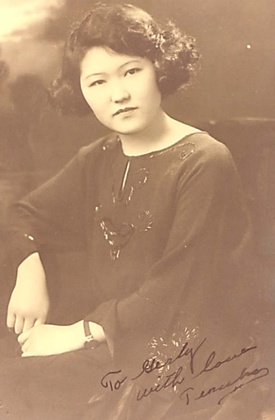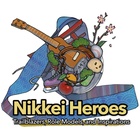I often could feel the presence of another person, even though nobody was there and would frequently hear voices that only I could hear. It was strange to me and I couldn’t stand it as to why other people couldn’t hear the voices. This was my situation six years ago, during the time when I was diagnosed with schizophrenia by a psychiatrist. I dropped out of college and was involuntarily hospitalized. I had no freedom in the hospital, and the psychiatrists prescribed me strong antipsychotic medicines. The medicines sapped my willpower and motivation and I felt unable to move.
My great-grandparents also had an experience of being “forced” which took the form of the incarceration of Japanese Americans during World War II. During the war, the Japanese Americans faced injustices with an attitude of stoic resignation, called gaman. Even today, amongst Japanese Americans, the Japanese word for perseverance, “gaman,” is frequently used as an encouragement to remain stoic and calm during difficult times. The Japanese American community during that time was already rooted in the gaman culture and whenever a problem arose, people would repeat the refrain “gaman” and hold back their emotions. However, I’ve always wondered if that was really true. Even if most of the Japanese American families did remain stoic, my great-grandparents did not.
My great-grandfather was a dentist in Portland, Oregon and was considered to be a leader of the Japanese American community there. The FBI arrested him shortly after the Attack on Pearl Harbor on December 7, 1941 and eventually incarcerated him at the Santa Fe concentration camp in New Mexico. The government incarcerated my great-grandmother and the children separately at the Minidoka concentration camp in Idaho.
When the FBI arrested my great-grandfather, my great-grandmother eschewed the gaman spirit and cried openly. When she and her children were brought to Minidoka, they all cried together. My great-grandmother writes of being depressed while inside Minidoka and would sometimes lie in bed all day. There were days where she had hope, but also days where hope proved difficult to find. She must have realized that nothing would change from just repeating the gaman refrain with a stoic face.
While in camp, my great-grandmother would write letters to my great-grandfather in which she expressed times when she was losing hope of seeing him and asking if there was a god in this world. In another letter, she would write about how the children (including my grandfather) looked melancholic and sad. I found these letters by accident, hidden away a cabinet in my great-grandmother’s house. At that time I had been discharged from the hospital, but I still didn’t know what I was going to do with my future.
These letters were invaluable treasures to me. I already had heard about the word gaman whenever the story of a Japanese Americans came up, so I thought that my great-grandmother’s letters would also include that word. However, the word gaman did not show up even once. I thought to myself, “how did she endure these injustices without the spirit of gaman?”
There were all kinds of stories in the letters. There was one about a mysterious disease that was spreading around camp, another about how her son killed a rattlesnake in the desert, while another would be about how the children would avoid her during mealtimes. However, in every single letter, she always wrote about how she wanted to see my great-grandfather again. Sometimes, she even touched upon the things that she cried about. She also wrote about how being able to openly express even just a little of her feelings made her feel like she was alive and human and gave her hope, even in the confinement of camp.
I felt that for my great-grandmother, it was not holding back her feelings, but openly expressing them which was what allowed her to deepen her connections and bonds with other people. I struggled to hold back tears as I read these letters.
As the chōnan, or eldest son, my mother would often tell me to be mindful of my actions and manners as my little sisters were looking up to me as their role model. My mom never told me to gaman, however I fully understood the need to do so. So, when I started hearing voices that other people could not hear, I embraced the gaman spirit and tried to persevere without saying anything. These voices sometimes would tell me to kill myself. There are also times when I would hallucinate about people wanting to kill me. Sometimes, I would also get weird looks from people around me for my strange behaviors. Every day was filled with dread. However, I convinced myself that I should be holding it in and didn’t tell anyone about my condition. Due to that, I slowly became more and more erratic and finally was involuntarily hospitalized. I felt like garbage and contemplated suicide.
During all of that, my great-grandmother saved me. My great-grandmother had already passed away by the time that I was born. However, through her letters, I was able to learn what kind of person she was. She did not hold back and freely expressed her feelings to both her husband and her children. There are times when we as humans cannot hold anything in any longer. By expressing our feelings, people can empathize with one another, which creates an atmosphere of trust, thereby allowing us to strengthen our bonds with one another. Inside the camps, everyone had painful moments and moments when they wanted to give up. However, my great-grandparents supported each other during these times and expressed their feelings, which helped them get through this difficult ordeal in camp. My great-grandmother taught me that it’s ok to not gaman; that when going through difficult times we need not hold back our feelings.
Since reading my great-grandmother’s letters, I became more able to openly express my feelings. My friends and family slowly, but surely started to understand my mental disorder. We were able to build relationships based on trust and strengthened our bonds with one another. I even got the courage to try out new medicines and as a result, I began to to regain my motivation.
Five years ago, my youngest sister died by suicide. She was 16 years old. In grieving our loss, when did not hold back. Far from the spirit of gaman, we cried together, we screamed together, we wept together. Immediately before her death, my sister did not voice complaints or report any problems at school. She didn’t seem depressed and she was in good health, so we didn’t understand why she commited suicide.
In the Japanese American community, there are many who keep their trauma hidden, endure it by themselves, and who do not speak about it with other people. No matter the problem, there is a feeling that it should just be endured internally and that our experiences of trauma should be swept up under the rug. We call this the “Japanese spirit (Yamato damashii),” that no matter the problem, we will not give in to it. I do not think that this way of thinking is right. My great-grandmother was a wise person and she understood that it is not good to hold it in too much. Even in a situation where you are not in control, you still can exercise agency by expressing your emotions. For me, I understand now how important my emotions are.
Even now, I often think about my late sister and sometimes I still hear voices that other people cannot hear. I often talk about my thoughts and these voices with my friends and family. Expressing your feelings is a sign of being human and through this expression, I believe that I can maintain the bonds that I have with my friends and family. My great-grandmother did not hide her feelings and was able to live through the incarceration.
There are many painful things in this world. Living in isolation is difficult. If you continue to just bottle everything up, you will slowly become isolated. Rather than extoll the stoic virtues of Yamato damashii, we, the Japanese American community, should consider what it means to live by “Great-Grandmother-damashii.” Regardless of your past, sharing your experiences helps build a foundation of support. Human life is precious, and people’s feelings are important. Everybody has painful experiences and painful memories and there is no shame in expressing how you truly feel. If we understand each other’s struggles, then we can empathize and continue to live with one another.
© 2019 Sumōru Maunten




